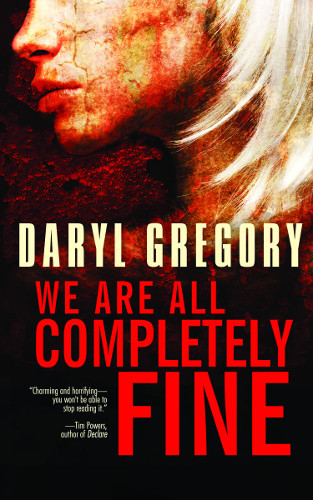Reviews and comments about Daryl Gregory’s WE ARE ALL COMPLETELY FINE abound

Reviews and comments about Daryl Gregory’s recently released We Are All Completely Fine are flooding in.
Joe Karpierz in the July 25, 2014 issue of The MT Void (Vol. 33, No. 4) enjoyed We Are All Completely Fine despite the fact it’s not the kind of book he usually picks up.
The big climax of the story is completely satisfying and follows naturally from what we’ve learned throughout the book. In my opinion, Gregory never forecast that climax; after reading in the genre for something like 45 years, I feel like I’ve seen most everything. And while the climax wasn’t wholly unexpected, the storytelling was superb enough that I wasn’t really sure and I really wanted to get to the end so I could find out because, well, I didn’t *know*. And I really wanted to know. I don’t experience that feeling very often these days. And the additional reveal, which was quite surprising to me and I *really* didn’t see coming, was a nice touch and didn’t feel forced or out of place–in fact, it made sense, given the rest of the story.
For Kirkus Reviews, John DeNardo named We Are All Completely Fine as one of Your Best Bets for Speculative Fiction Reads in August.
Horror fans needn’t feel left in the dark when it comes to reading suggestions. For starters, try We Are All Completely Fine by Daryl Gregory. Described as a “post-horror horror” novel, this unique story is about a group of people affected in various way by the horrors of life, whose stories are only believed by the psychotherapist who brings them together to form a most unusual support group.
Chance Maree on Out of My Mind found Gregory’s novel as intriguing as Lovecraft, full of suspense and dread, but unique enough that she didn’t feel the author was riding any coattails.
I’ve not encountered many authors in the horror genre who flex literary muscle as well as Gregory. His approach was perfect for the story vehicle–the characters interact mostly in group therapy. The interpersonal dynamics of the therapy sessions were consistent with those I witnessed as a university student during the year I was considering a career in psychology. The psychological accuracies added to the novel’s verisimilitude, which is a considerable feat considering the paranormal aspect in character’s story.
At Fat Robot, Karina felt We Are All Completely Fine offered an interesting premise, characters with clear voices, and a storytelling style that quietly kept me turning the page until I ran out of book.
So is there anything wrong with the book? Possibly the story, or the plot, is a bit small, but I find this acceptable because my brain files this novella as pilot episode. It’s setup, it’s introducing the characters, showing how they get thrown together. An origin story made out of individual origin stories, sort of. A good pilot is different from a good episode, or film, or whatever. Even if this doesn’t get a sequel – though I feel like it was strongly implied, and I would be happy to have one – it’s still a book that is, well, good at being what it is. I’m not disappointed.
For information on We Are All Completely Fine, visit the Tachyon page.
Cover design by Elizabeth Story.
